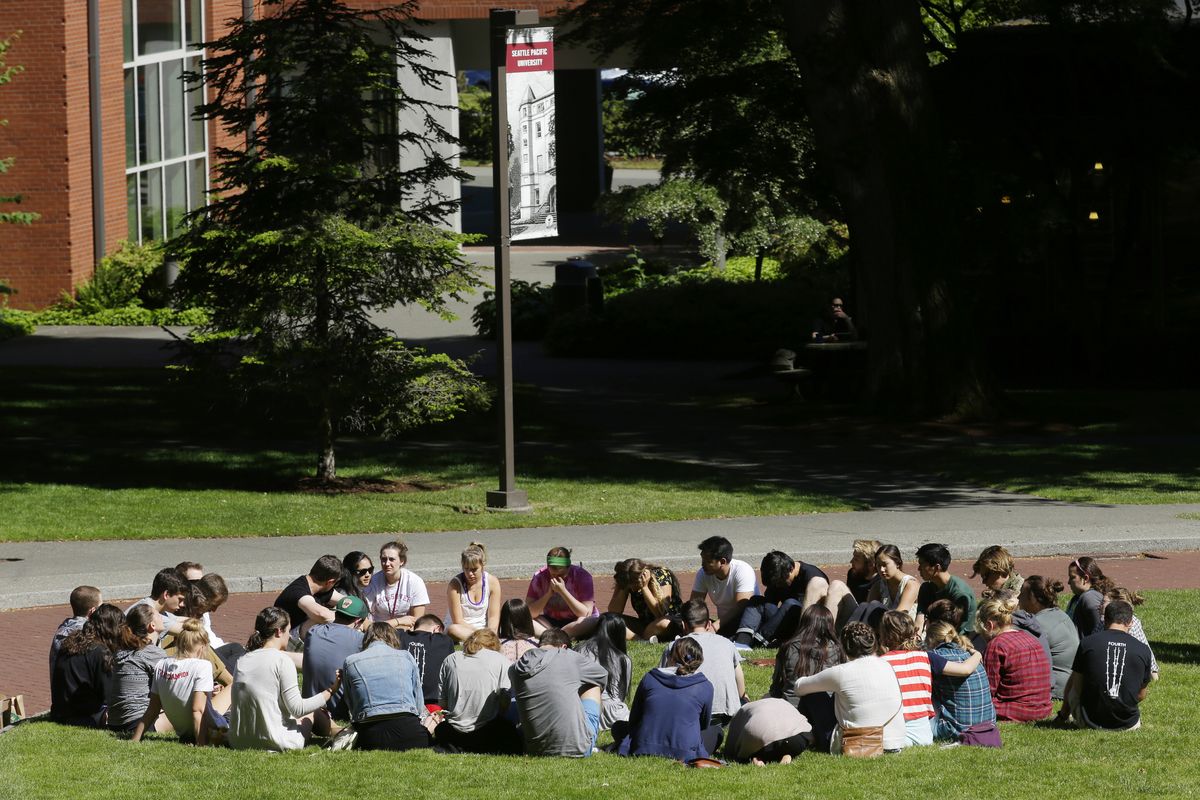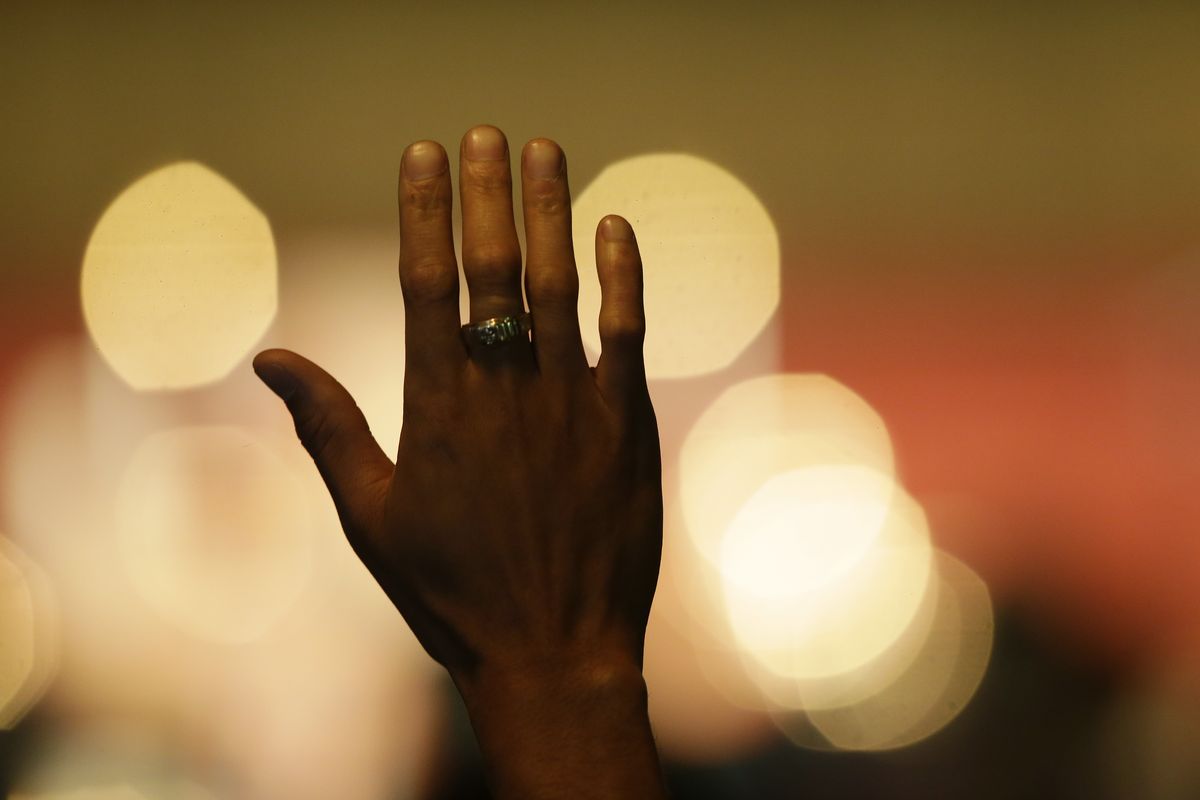SPU community falls back on faith in face of tragedy
Students and other supporters form a prayer circle on the campus of Seattle Pacific University on June 6, the day after the shootings. (Associated Press)
SEATTLE – In the hours after a gunman killed one Seattle Pacific University student and wounded two others on June 5, what struck many was the way the students responded.
They clasped hands in prayer circles; lifted their voices together to sing hymns; prayed for the shooter as well as the victims.
“I have never been more proud of this institution,” Richard Steele, a professor in SPU’s School of Theology, wrote in an email to friends. “The faith, courage and calmness were just stunning.”
The response of the students, faculty and staff to the startling violence highlights the role of religious belief at SPU. The small evangelical Christian college, on the north slope of Queen Anne Hill, stands out in the Seattle area for the degree to which it works on developing students’ faith and for fostering a tight-knit community.
All undergraduates must take at least three courses in theology, and are encouraged to attend worship services, Bible studies, Bible retreats and other such activities to nurture their faith. They are expected to adhere to a code of conduct that prohibits premarital, extramarital or homosexual sex, as well as the use of alcohol or tobacco on campus, and marijuana on or off campus.
The some 4,000 students are predominantly Christian, although there are a few non-Christians at the school, which was founded in 1891 by the Free Methodist Church of North America.
Faculty and staff must be professing, practicing Christians.
Community is emphasized, with students encouraged to participate in activities through their academic majors, residence halls, campus leadership positions, or through ministry or volunteer service.
All of that – and especially his theology classes and relationships with others at SPU – helped develop the faith of Alex Piasecki, a 21-year-old junior majoring in theology.
He is drawing from that faith now, even though “I don’t know if there’s any way of making sense of what happened,” Piasecki said. “I’m placing a lot of faith in God at this time. It’s a new thing for all of us. It’s very hard to go through. I truly believe that God is the ultimate healer and redeemer. We’re just going to have to be patient through this process.”
In light of the school’s emphasis on faith- and community-building, it did not surprise Bob Zurinsky, SPU’s assistant director of university ministries, that students, faculty and staff responded the way they did.
“What we’ve witnessed at SPU,” he said, “has been not so much a reactive burst of energy, but rather a deep response that reflects many years of immersion in the practice of grace, worship and life together.”
During the prayer services, the first held only hours after the shootings, “each of us felt the weight of this horror and grief, but we were not lost,” Zurinsky said. “The essence of the Christian faith that we teach and try to embody on this campus gave us the words and the vision we were looking for.”
While many at SPU drew a measure of solace and hope from their faith – thinking of their classmates, Paul Lee, who died, and Jon Meis, who acted selflessly and quickly in stopping the violence – there were no easy answers.
“We’re allowing ourselves to not really have answers, to have whatever feelings we are having,” said Megan Wildhood, a 28-year-old graduate student at SPU’s Seattle Pacific Seminary, who says her faith was very much shaped over the years by the support and care of the School of Theology faculty. “What I’m seeing most is the desire to really be together, to find each other, to look after each other. To both give and receive the love of Christ.”
That quality also struck Jack Levison, a professor in SPU’s School of Theology, as he sat in a silent prayer circle on the campus lawn with a group of students.
“They lingered in grief. Not despair, grief,” Levison said. “I was really moved by their ability to allow so much silence, to allow so much ambiguity, to allow bewilderment to settle in their lives. They were lingering in the presence of a God they didn’t understand but they wanted to linger there anyway, in God and each other’s presence.”
Which is a good thing, said Frank Spina, an SPU School of Theology professor.
At the prayer services Spina helped organize shortly after the shootings, he saw people “willing to get angry, to lament, to be confused,” he said. “When you’re Christian, you’re honest and willing to admit that bad things happen and you’re mad that bad things happen. … Sometimes, the faith response is: ‘We’ve got all the answers, everything worked out, let’s sing kumbaya.’ This wasn’t that. This was a very nitty-gritty, realistic, not sugarcoated kind of response.”
There was anger at the shooter, yes, and no rush to forgiveness, for to do so so soon would trivialize what the gunman did, Spina said.
Yet, in addition to the prayers for the victims, Spina heard many prayers for the shooter.
There is something that comes from the practice of faith that allows for grief without despair, said theology professor Steele.
“We can experience anger, even rage, but we do not give vent to vengefulness. We can experience intense grief but we do not lose hope. We recognize the brokenness in ourselves and therefore try to extend compassion and mercy to other people whose brokenness has been unleashed,” Steele said. “This is our darkest day and our finest hour.”

